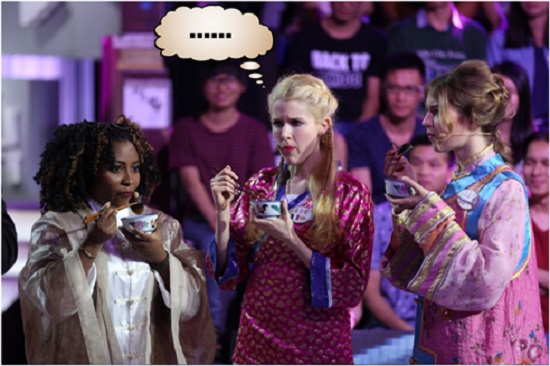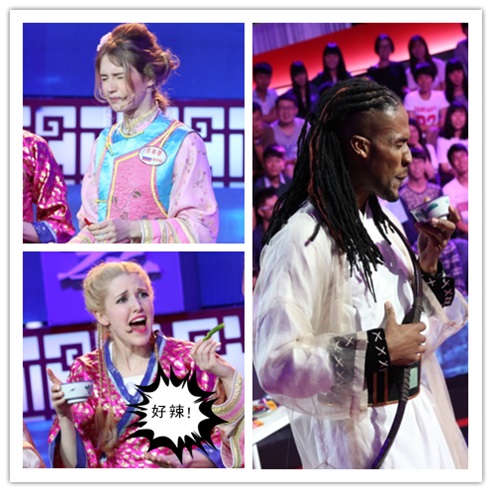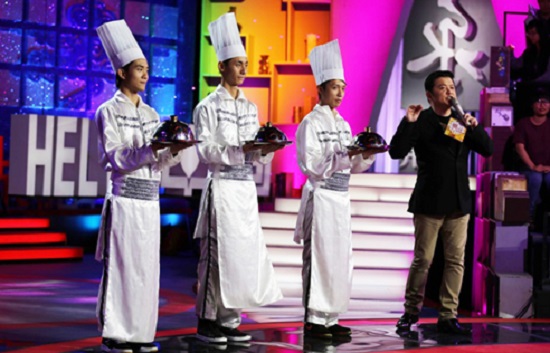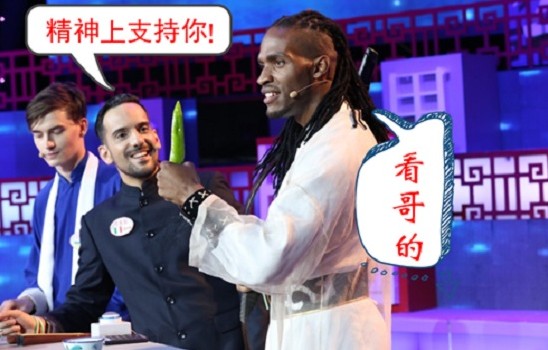Soon-to-be retired David Letterman made his audience laugh for years with silly sketches like “Will it Float?” and “Stupid Pet Tricks”. Letterman both satirized and catered to his audiences by providing them with compelling TV that didn’t really have any meaning.
A popular Chinese television show is riffing on that recipe today. Shot after shot, performers are seen putting things in their mouths with chopsticks and swallowing as though it were drama. This may make sense if it was a cooking show, but this is a show about foreigners. And wherever foreigners on TV are concerned in China, this isn’t just about entertainment, but education.
That’s the driving purpose behind Hello China, a show on the Guangdong Satellite TV Network. Filmed before a studio audience, Hello China is a variety show that features competition and games to test how well its non-Chinese guests have adapted to life in China.
 Considering that all the foreigners featured on Hello China speak fluent Chinese, wear traditional Chinese clothing, and practice Chinese culture such as martial arts and poetry reciting, you’d think that they have been successful in “becoming Chinese”. But as much as this show is geared towards the spread of Chinese culture to Westerners, Hello China is a show in which its Chinese audience learns more about foreigners than its guests learn about China.
Considering that all the foreigners featured on Hello China speak fluent Chinese, wear traditional Chinese clothing, and practice Chinese culture such as martial arts and poetry reciting, you’d think that they have been successful in “becoming Chinese”. But as much as this show is geared towards the spread of Chinese culture to Westerners, Hello China is a show in which its Chinese audience learns more about foreigners than its guests learn about China.
Westerners have no reason to watch this show, even if they could understand Chinese and are fans of wacky variety shows - if you want to learn and appreciate Chinese culture, there are easier ways to do so, without the sound effects. On the other hand, Chinese audiences can ‘learn’ all about foreigners through a Chinese cultural standpoint.
The first lesson Chinese audiences learn from this show is that foreigners uniformly love China. Each foreign guest is introduced with a brief interview with the questions “What do you like most about China?”, “Why did you come to China?”, and “So what do you think of China?”, questions that foreigners often find themselves answering upon meeting someone for the first time. The guests, all of whom are said to be “foreign exchange students”, answer positively by raving about something specific in Chinese history or culture. After providing flattering examples, the catering is duly rewarded with applause from the audience.
The second lesson Chinese audiences can learn from this show is that expectations of laowai, the colloquial term for foreigners in China, are low. The TV upshot of this is that laowai have a capacity to constantly astonish.
 Host Zhao Yi’ou repeatedly says “Wow!” when the foreign guests are seen eating exotic Chinese delicacies like thousand year-old egg and stinky tofu as though they are performing some kind of death-defying stunt. These guests are all treated like they just got off the plane and have been given a Chinese cultural baptism by fire.
Host Zhao Yi’ou repeatedly says “Wow!” when the foreign guests are seen eating exotic Chinese delicacies like thousand year-old egg and stinky tofu as though they are performing some kind of death-defying stunt. These guests are all treated like they just got off the plane and have been given a Chinese cultural baptism by fire.
Despite their obvious familiarity with Chinese culture, these foreign guests still aren’t accepted as being Chinese, of course. But the willingness of the foreign guests to eat food that the Western-dressed Zhao calls “the foods foreigners fear most ” makes for compelling viewing, for a Chinese audience at least.
The Yangtze Evening Report published a write-up on last week’s Hello China show that made it sound like the foreign guests were terrified by common dishes, when in fact they had little reaction at all:
[Upon seeing the food revealed], all of the laowai were scared half to death! Two of the foods selected are what foreigners consider to be the “most disgusting foods (in the world)”. The laowai bashfully swallowed the food while the audience were overjoyed at the sight.
 Eating stinky tofu or thousand year-old egg is something that people do everyday. You might be doing it right now, even. But when a non-Chinese is witnessed by a Chinese audience doing this, it somehow becomes an affirmation of Chinese culture, despite being over-the-top in its pandering.
Eating stinky tofu or thousand year-old egg is something that people do everyday. You might be doing it right now, even. But when a non-Chinese is witnessed by a Chinese audience doing this, it somehow becomes an affirmation of Chinese culture, despite being over-the-top in its pandering.
Hello China airs every Sunday evening, you can watch it online here.


